Navigating the future of women’s healthcare in Saudi Arabia: Insights and challenges
On October 18th, the Atlantic Council’s empowerME Initiative, in collaboration with the United States Embassy in Saudi Arabia and PepsiCo, held a workshop titled “Women’s economic participation and its impact on healthcare in Saudi Arabia.” The panel focused on the shifting roles of women within Saudi society, with a deep dive into the ripple effects this phenomenon has on the healthcare sector.
Keynote remarks were provided by Dana AlAjlani, co-chairwoman of The American Chamber of Commerce in Saudi Arabia, and Lynn Monzer, associate director of the WIn Fellowship at the Atlantic Council, delivered the closing remarks. The discussion was led by Noor Osama Nugali, acting deputy editor-in-chief at Arab News, and featured three prominent Saudi women in the healthcare: Fatimah Alhamlan, a consultant and women’s health advocate at the King Faisal Specialist Hospital and Research Centre; Samar Nassar, managing director for healthcare services and technologies at the Saudi Arabia Ministry of Investment; and Naseem Almulla, customer experience director at the Council of Health Insurance.
Dana AlAjlani highlighted that women in healthcare in Saudi Arabia, from midwives to doctors and administrators, showcase exceptional skills, education, and dedication in delivering patient therapy and shaping patient-centered care models globally. However, despite their significance presence, the healthcare industry still grapples with gender-related challenges.
Progress Made in Women’s Healthcare in Saudi Arabia
Samar Nassar discussed the healthcare sector’s resilience during the COVID-19 pandemic, highlighting the rapid developments made, particularly in virtual care. Dr. Fatimah Alhamlan highlighted the substantial progress in women’s healthcare in Saudi Arabia, marked by notable advancements in legal and social reforms. For instance, women no longer require male guardian approval to receive medical treatment or make healthcare decisions. This means more autonomy, independence, and assurance of confidentiality for women’s health. Dr. Alhamlan also emphasized the importance of social entrepreneurship in creating value-driven opportunities within the healthcare sector. Recognizing the challenges women face taking their children to hospitals, Saudi entrepreneurs have responded by establishing women’s health clinics in malls to ensure accessibility for all.
Naseem Almulla noted that as more women have entered the private sector, there has been a growing emphasis on providing access to preventive services rather than relying on treatment. In 2022, the Ministry of Health released an essential reference package that includes special components for women’s health, such as breast cancer screening, surveillance, pre- and post-menopausal care, pregnancy support, and bone density exams. This represents a significant shift towards proactive healthcare for women.
Dr. Alhamlan noted that there is a shift towards prioritizing health and wellness in Saudi Arabia rather than solely focusing on disease treatment. While Saudi Arabia has top-tier hospitals and cutting-edge technologies, the focus is now on preventive medicine. The goal is to enhance overall health and quality of life and ultimately reduce the number of patients in hospitals. Dr. Alhamlan recalled the definition of health according to the World Health Organization (WHO): “Health is not merely the absence of disease; it encompasses mental, physical, and social well-being. Even for individuals with chronic illnesses, the emphasis is on promoting well-being, adaption, and a high quality of life. Companies like Kayani, a fitness entity, are working to empower women and provide the necessary infrastructure for sports and physical activities. She mentioned that the Public Investment Fund (PIF) consistently announces new healthcare and wellness-related initiatives, reflecting a strong dedication to disease prevention and a high quality of life.
Challenges and Opportunities
All panelists agreed on the ongoing challenges of women ascending to leadership positions within healthcare. Almulla highlighted the ongoing limitations in women’s involvement in financial decisions, digital transformations, and operational aspects of the healthcare industry. Samar pointed out the conspicuous disparity in executive leadership roles, which have remained stagnant at 20 percent over the past two decades. According to WHO, women make up 67 percent of the global healthcare workforce and 76 percent in the United States. It’s important to note that these statistics include a variety of roles within healthcare, such as technologists and practitioners. In comparison, Nassar pointed out that the Saudi Commission for Health Specialties has reported a 40 percent representation of women, suggesting a relatively strong level of female representation. Yet, this figure becomes less impressive when considering that women account for one or two out of every ten executive leadership positions. Almulla stated that the integration of women into more operational, engineering facilities, and financial decisions is pivotal for the future of the Saudi healthcare system. Nassar underscored that increased women’s participation leads to more disposable income, greater spending, improved productivity, and better utilization of healthcare services.
The healthcare sector’s risk-averse nature is driven by the imperative to prioritize patient well-being and data privacy, which relegates health entrepreneurs to a less prominent position. Nassar discussed the stark gap in women’s representation in entrepreneurship in the healthcare sector in Saudi Arabia, notably falling below 1 percent. Bridging this gap has significant economic benefits. As a representative of the Ministry of Investment, she confirmed that the diversity and inclusion of women, in the workforce and in leadership positions, enhance Saudi Arabia’s appeal to investors, promoting a thriving Saudi entrepreneurial ecosystem. She spotlighted a successful example, Sophie Smith, a WIn Fellowship Mentor from the UAE, who created Nabta Health. This women’s health app addresses the significant gap in healthcare technology tailored to women’s physiology, an area traditionally overlooked.
A broader issue of gender diversity exists in various fields in Saudi Arabia, including fintech and STEM, as well as the gender gap in research and funding. Nassar emphasized the need to establish mentorship programs that support promising talent in healthcare, guide them toward venture development and secure the necessary funding. Incorporating women into recruitment strategies, providing intensive development programs, and offering training initiatives is crucial. Ultimately, fostering diversity and innovation in healthcare has a significant and positive economic impact.
Dr. Alhamlan, Almulla, and Nassar agreed that aside from the burden women face of proving themselves in the workplace, women lack the services and facilities to enable them to work while simultaneously starting a family. All the panelists emphasized the necessity of a support system to break the vicious cycle of struggles faced by women. Dr. Alhamlan underscored the significance of work-life balance as more women dedicate extended hours to the workplace. The ongoing social changes and transformations demand equilibrium between work and family life, a key determinant of individuals’ quality of life.
Nassar highlighted that the quality of life hinges upon service availability, highlighting the imperative for Saudi Arabia to enhance its services as countries like the UAE and Singapore offer more accessible and top-notch service provisions. Dr. Alhamlanfounded the Rofaida Women’s Health Organization to address challenges in the healthcare system. She collaborates with civil society organizations to elevate the community’s voice and drive progress through research. Almulla and Dr. Alhamlan stressed the importance of support systems for maternity care and maternity leave, drawing from their own polar experiences and contrasting the support system in the United States versus Saudi Arabia. Almulla noted that some countries offer up to three years of paid maternity leave. They underlined that supporting woman in the workforce, especially in demanding fields like nursing, addressing cultural barriers, and improving pay are crucial steps in elevating the healthcare system and strengthening the overall economy in Saudi Arabia.
The Way Forward
Policy changes, societal acceptance, and an expansion of healthcare services have considerably widened the scope of women’s roles within the healthcare industry. However, a persistent glass ceiling still limits women’s full participation in leadership and entrepreneurship within the healthcare industry. Addressing this discrepancy is a multifaceted challenge that calls for concerted efforts from governmental bodies, corporations, and civil society alike.
The Saudi Arabian healthcare sector should aim to be more proactive in opening channels for innovation and entrepreneurship for women. With the Femtech market in the MENA region expected to hit $3.8 billion by 2031, there is a significant opportunity to leverage technology that targets women’s health issues. Femtech, also known as female technology, is a range of software, diagnostic tools, products, and services that leverage technology to address women’s health issues.Female entrepreneurship has the potential to address the unique and overlooked healthcare needs, like UAE based Nabta Health’s focus on women’s physiology, creating an enabling environment for FemTech startups should be a priority.
Furthermore, the government and private sector stakeholders should engage in dialogue to address the specific challenges and opportunities in increasing women’s participation in healthcare. For instance, the predominance of male investors in the region means a lack of understanding and investment in healthcare products geared toward women. Hence, a gender-sensitive approach is the right strategy for economic growth and for enhancing Saudi Arabia’s appeal to international investors. Improving healthcare for women not only benefits female patients and consumers but also creates value for investors, stakeholders throughout the value chain, and society at large.
Gender equity in healthcare is a shared responsibility that demands the active participation of all stakeholders. The insights from this panel provide not just a snapshot of where we are, but also a roadmap for where we need to go. The focus must now shift from discussion to action, turning the insights and recommendations of this event into sustainable progress.
Lynn Monzer is the Associate Director with the Atlantic Council’s empowerME initiative at the Rafik Hariri Center for the Middle East.
Diane Mohamed is a Young Global Professional with the Middle East Programs at the Atlantic Council.
Explore the WIn Fellowship
Related content
Sponsors & in country partner


empowerME
empowerME at the Atlantic Council’s Rafik Hariri Center for the Middle East is shaping solutions to empower entrepreneurs, women, and youth and building coalitions of public and private partnerships to drive regional economic integration, prosperity, and job creation.
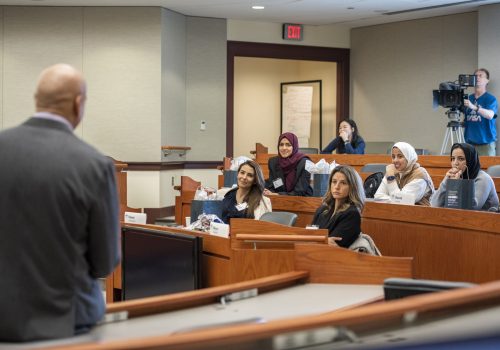
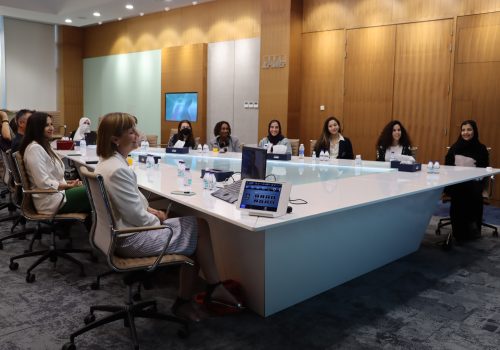
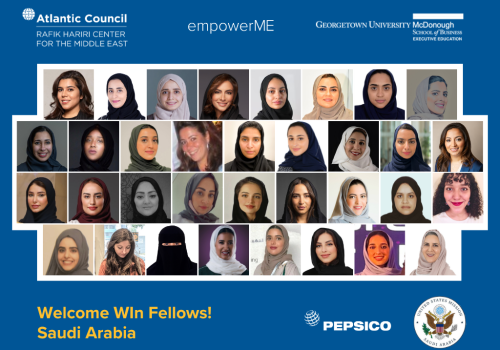
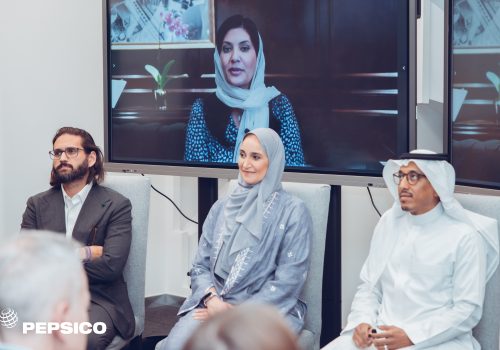
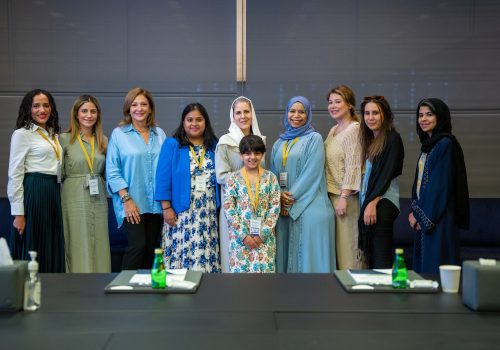
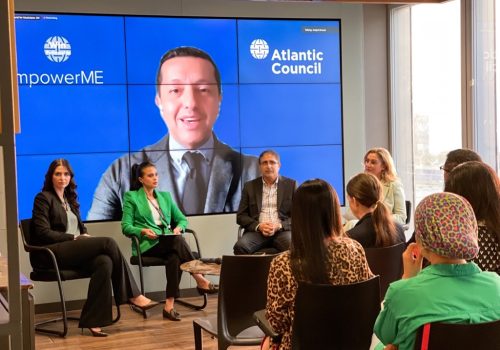
Follow the conversation on social media with @ACMideast and using #ACempowerME